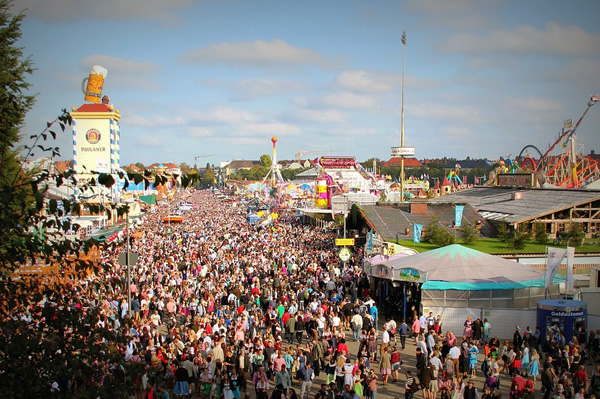The Oktoberfest in Munich, Germany
Much More than Just a Beer Festival
By Isabel Eva Bohrer

|
|
A scene of celebration at the Munich, Oktoberfest.
|
The German Crown Prince Ludwig once remarked that folk festivals particularly delight him as they express a nation’s essential character, which in turn is inherited by children and children’s children. While the Munich Oktoberfest, to which the Prince was referring, has certainly changed since its initial celebration in 1810, there are traditions whose traces can still be seen. Most tourists, or even most citizens of Munich, will likely not observe these reminiscences of the past; to them, the “Mass Bier” (liter beer) along with a “Hendl” (half a chicken) is clearly the centerpiece of their diversion.
There appears to be a common misconception concerning where the Oktoberfest initially came about relative to where it is celebrated today. Nowadays, there are imitations worldwide, from Canada to Brasil. And while these “copies” are no doubt successful — the Canadian version is the leader with 700,000 visitors a year — the original is the most famous of them all: the Oktoberfest in Munich, Germany.
Contrary to widespread thought that the Oktoberfest was brought about with a decree by the King, the Bavarian festival was initiated by the citizens. Specifically, it was an addition to the royal wedding celebration bringing together Crown Prince Ludwig and Princess Therese on Friday, October 12, 1810. Under normal circumstances, this wedding would have remained in Bavarian history like any other, had it not been for the idea of conducting a horse race to honor the royal family.
Franz Baumgartner, a lower-class coachman and National Guard, was the one who presented this idea to his commander Andreas Dall’Armi, who took over the organization of the race once it had been approved by the royalty. This horse race became the attraction on which the ensuing Oktoberfests were based. In fact, it was only in 1913 that the horse race was abolished.
During the year’s bicentennial, the horse race will be re-enacted such that visitors can re-experience the traditional origins of the Fest. But this is not the only historical aspect that Munich will show its visitors. For many years, the Oktoberfest served two main purposes: a celebration of the royal family and a showcase of local agriculture. You must imagine that in those days, Munich and the surrounding area was agrarian land. The Oktoberfest was an ideal place for farmers to present, and moreover celebrate, their achievements. Though the present-day Fest is certainly not one for farmers, traditional food and drink continues to be a central part of the experience. A further tradition is sometimes recalled: at the special historic tent, visitors can bring their own sausages to be grilled onsite — a great alternative for those who think that the price of half a chicken at around €15 is getting too high.
Parting from a monarchical focus, the Oktoberfest thus slowly acquired a more multi-fold purpose. From being “solely” the addition to a royal celebration, it became a diversion for the masses. Countless showmen and entertainment activities were brought into town. Their traditions remain to this day, such as cabinets of mirrors, haunted houses, and rollercoasters — the first of which dates back to 1908.
Evidently, the Oktoberfest initially attracted the citizens of Munich, and later, those of Bavaria as a whole. With the development of transport systems and mass communication, national and subsequently international visitors began to flock to the festival. Far earlier, the functions of the Oktoberfest were divided, but in 1819, Munich’s city administration became responsible for the entire festival (apart from the agricultural fair which at that time was supervised by the Bavarian Agricultural Society).
It is Munich’s city administration which conserves the national character of the Oktoberfest to this day. Even though Belgian beer companies have acquired shares of Bavarian breweries, thus buying themselves into certain food tents, there is a high value still placed on tradition. Everybody is welcome to come, have a beer and enjoy themselves, but not to present their goods at the “Wies’n,” which is what citizens of Munich call the Fest, referring to the “Theresienwiese” on which it is held. Gabriele Weishäupl, who has been heading the administration of the Oktoberfest for over 20 years, is intent on maintaining the tradition. And for good reason: Munich is a city with a rich cultural history, and its primary folk festival deserves to conserve its customs.
Isabel Eva Bohrer is the Director and Founder of ROOSTERGNN Global News Network, a non-profit news agency.
|
